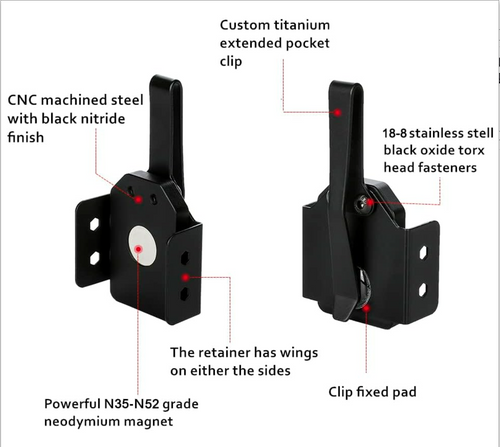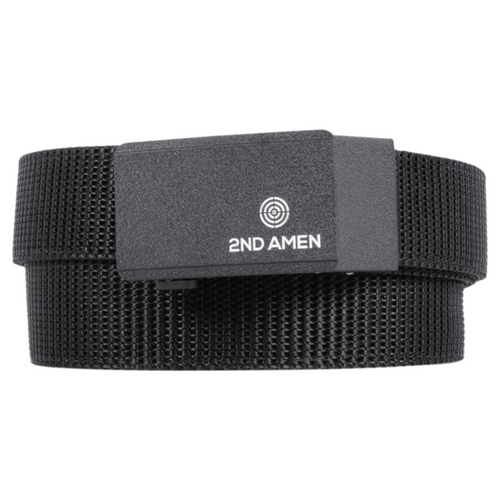Moms who carry concealed firearms face unique challenges balancing safety, accessibility, and parenting duties. Here's a quick summary of the top safety tips to help you stay prepared and confident:
- Use Secure Holsters: Choose holsters with full trigger coverage, adjustable retention, and durable materials to keep your firearm safe during movement.
- Maintain Control: Regularly check your setup to ensure your firearm stays secure and concealed while managing daily parenting tasks.
- Prioritize Comfort: Select holsters made with skin-friendly materials and ergonomic designs for extended wear without discomfort.
- Adjust Carry Positions: Modify holster placement to suit activities like carrying a child, buckling car seats, or playing.
- Practice Regularly: Schedule consistent training to build muscle memory and confidence, even under stress.
Quick Comparison of Holster Options
| Holster Type | Best For | Key Features | Safety Notes |
|---|---|---|---|
| IWB (3-5 o'clock) | Everyday carry | Deep concealment, versatile placement | May need adjustment when bending |
| Appendix (1 o'clock) | Quick access | Fast draw, secure retention | Practice safe draws while holding a child |
| OWB (strong side) | Home/property tasks | Comfortable, easy to wear | Requires cover garment |
| Belly Band | Active parenting | Adjustable, fits any attire | Check retention after activity |
| Breakout 2.0 IWB | All-purpose carry | Adjustable retention, secure, comfortable | Ideal for frequent position changes |
CONCEALED CARRY FOR MOMS | Keeping yourself and ...
1. Use Secure On-Body Holsters
Choosing the right holster is a key decision for moms who carry, as it directly impacts both safety and accessibility during everyday parenting activities. The main priority should be retention - your holster needs to keep your firearm secure, even during active movement.
Here’s what to look for in an on-body holster:
- Full trigger guard coverage to prevent accidental discharge.
- Adjustable retention to keep the firearm secure during movement.
- Durable materials that can handle daily wear and tear.
- Comfortable design for long periods of wear.
Holster placement is just as important as the holster itself. While the 4 o’clock position is a common choice, appendix carry (around 1 o’clock) often provides better control and quicker access - especially when managing tasks like buckling car seats or carrying kids.
The Houdini Holsters Breakout 2.0 IWB system is a great example. Its patent-pending, custom-fit design ensures your firearm stays in place, even during physically demanding activities.
To ensure maximum security and comfort, keep these tips in mind:
- Test retention: Turn the holster upside down (with an unloaded firearm) to check if it stays secure.
- Verify trigger protection: Make sure the trigger is fully covered.
- Check for comfort: Look for smooth edges and avoid pressure points.
- Confirm concealment: Test the holster with your everyday wardrobe and movements.
A secure holster isn’t just about the physical design - it’s also about your confidence in carrying. Practice drawing your firearm from your chosen position to build muscle memory and maintain control while balancing parenting responsibilities.
2. Keep Your Firearm Under Control
After choosing a secure holster, the next step is ensuring you maintain control of your firearm at all times. Balancing parenting responsibilities with carrying a firearm requires constant awareness and a reliable carry system.
Regularly check your setup to ensure it remains secure and ready for use.
The Breakout 2.0 IWB holster from Houdini Holsters offers adjustable retention and a custom fit, giving you peace of mind while managing your daily routine with your family.
3. Choose Comfortable, Easy-to-Access Holsters
When it comes to holsters for busy moms, comfort and quick access are just as important as secure retention and control. A holster should stay secure and comfortable during everyday parenting tasks like lifting kids, bending, or reaching for items on high shelves.
Key comfort features to look for:
- Breathable, skin-friendly materials to prevent irritation.
- Adjustable retention to fine-tune the level of security.
- Ergonomic designs that fit your body comfortably.
- Smooth edges to reduce discomfort during movement.
Another crucial feature? The holster should allow for a full firing grip before drawing. This is especially important for moms who may need to react quickly, even while holding a child. A good example is the Breakout 2.0 IWB holster, which combines fast access with reliable concealment.
Test your holster with daily activities:
Try the holster while performing everyday movements like:
- Picking up your child
- Bending to grab something
- Sitting in a car
- Moving between standing and sitting
A well-designed holster should stay in place, remain concealed, and allow for a consistent draw, no matter what position you're in. It’s important that it doesn’t shift or become uncomfortable, as this could discourage regular use.
| Movement Type | Holster Needs |
|---|---|
| Bending | Stays securely in place without moving |
| Lifting Children | Remains concealed while reaching |
| Sitting in a Car | Maintains accessibility |
| Active Movement | Provides reliable retention |
Consider holsters that come with lifetime guarantees or trial periods. This allows you to test how they perform in your daily routine and ensure they meet your needs. Comfort and accessibility are critical - not just for convenience, but also for safety.
sbb-itb-7fb5bb8
4. Modify Carry Position for Parent Tasks
When you're a parent who carries, your holster setup needs to adapt to your daily routine. The goal is to keep your firearm secure, accessible, and safely positioned, especially during tasks like holding or playing with your child.
For example, shifting your holster forward or raising its height can create a safer space between your firearm and your child. These small changes can make a big difference when you're lifting, bending, or engaging in active play.
The Houdini Holsters Breakout 2.0 IWB holster is a great option for this. It’s designed to allow easy adjustments while keeping your firearm secure. This means you can tweak your carry position based on what you’re doing - without compromising quick access.
Here are some specific tips for common parenting tasks:
| Activity | Recommendation | Focus |
|---|---|---|
| Carrying a Child | Adjust holster placement to keep the firearm separate | Prevents accidental contact during holds |
| Active Play | Choose a position suited for movement | Keeps carry concealed and accessible |
| Car Seat Buckling | Modify the angle for easier seat operations | Balances concealment with readiness |
| Running Errands | Pick a neutral, comfortable position | Ensures a consistent draw stroke |
Additional Tips:
- When bending or lifting, try adjusting the cant angle slightly forward for better comfort and movement.
- Use a holster with adjustable ride height and cant for longer tasks to maintain safety and ease of draw.
- Regular practice is key. Test your draw from these adjusted positions to ensure you can still get a full grip and a smooth, reliable draw every time.
Fine-tuning your carry position helps you stay prepared while managing the demands of parenting.
5. Practice and Learn Regularly
Consistent practice is crucial for maintaining firearm proficiency, especially under stressful situations. According to the National Shooting Sports Foundation, 72% of defensive firearm uses involve skill degradation caused by stress, highlighting the importance of regular training.
"Schedule range time like pediatrician appointments", advises tactical instructor Lena Miculek.
Suggested Training Schedule
Here's a simple plan to stay sharp:
| Training Type | Frequency | Duration | Focus Areas |
|---|---|---|---|
| Dry-Fire Practice | 3x weekly | 10–15 minutes | Draw strokes, trigger control |
| Range Sessions | Quarterly | 1–2 hours | Live-fire drills, accuracy |
| Formal Training | 2x annually | 4–8 hours | Defensive scenarios |
| Safety Reviews | Monthly | 30 minutes | Equipment checks, protocols |
Parenting-Specific Scenarios
Incorporate real-life parenting challenges into your routine. Virginia mom Elizabeth Brownell, for instance, keeps her skills sharp with 15-minute daily dry-fire sessions while wearing a baby carrier. Practice accessing your Breakout 2.0 IWB holster under typical parenting conditions, such as:
- Sitting in common parenting positions
- Handling a stroller or diaper bag
- Carrying a child-sized weighted training dummy
Tracking Your Progress
Use these FBI-standard benchmarks to measure improvement:
- Draw-to-first-shot time under 2.5 seconds
- 90% hit rate on 8-inch targets at 7 yards
- 75% accuracy during drills under high-stress conditions
"Parent Protector courses include scenario-based training with crying baby soundtracks to simulate real-world stress", according to the USCCA's training program documentation.
Affordable Training Tools
You don’t need to break the bank to stay prepared. These budget-friendly tools can help:
- LaserLyte Cartridge ($39.95)
- Free shot timer apps
- DIY home obstacle courses using everyday household items
With consistent practice and creative use of tools, you can build confidence and maintain readiness, even with the demands of parenting.
Holster Options Chart
Choosing the right holster is essential for moms who carry concealed firearms. This chart outlines holster types suited for different parenting scenarios:
| Holster Type | Best For | Parent-Specific Features | Safety Considerations |
|---|---|---|---|
| IWB (3-5 o'clock) | Everyday carry | Offers deep concealment and works with various outfits | May need adjustment when bending to pick up kids |
| IWB (appendix) | Quick access | Provides excellent retention and works well with baby carriers | Requires practice for safe draws while holding a child |
| OWB (strong side) | Home or property tasks | Comfortable for long wear | Needs a proper cover garment; extra care during child transfers |
| Belly Band | Active parenting | Adjustable position; fits with any attire | Check retention after physical activity |
| Breakout 2.0 IWB | All-purpose carry | Comfortable for extended wear with secure retention | Ideal for frequent position changes during childcare tasks |
Activity-Based Position Guide
Consider these holster positions for common parenting activities:
| Activity | Recommended Position | Key Safety Feature |
|---|---|---|
| Baby Wearing | Appendix carry (11-1 o'clock) | Keeps the firearm controlled during baby transfers |
| Stroller Walks | Strong side (3-4 o'clock) | Allows natural access while managing a stroller |
| Playground Time | IWB with reinforced retention | Minimizes exposure during active movement |
| Diaper Changes | Elevated position | Keeps the firearm away from the changing surface |
The Breakout 2.0 IWB holster stands out for its adjustable retention, offering both safety and accessibility for active parents.
To ensure your setup works seamlessly, test your holster during everyday tasks like bending, lifting, and reaching. Practicing these positions will help build muscle memory, ensuring safe and efficient handling.
Summary
Moms who carry concealed firearms need to prioritize both safety and practicality. The Breakout 2.0 IWB holster from Houdini Holsters offers a dependable option designed with parenting needs in mind.
Here are the main points to consider:
- Secure Retention: Choose high-quality on-body holsters that prevent access by others, even during busy parenting moments.
- Adjustable Positioning: Modify your carry position to work seamlessly with tasks like carrying your child, using baby carriers, or pushing a stroller.
- Consistent Practice: Regularly practice drawing and handling your firearm in situations that mimic daily parenting activities.
- Comfort Matters: Select holsters designed for all-day comfort to avoid the need for unsafe adjustments.
Balancing accessibility with security is essential for carrying as a parent. This holster is designed to support active parenting by maintaining both ease of access and secure retention.
As your routines evolve, make adjustments to your setup to stay prepared for any parenting situation.
FAQs
How can I keep my holster comfortable and secure while managing daily parenting tasks?
To keep your holster comfortable and secure during everyday parenting activities, choose a holster designed with both comfort and practicality in mind. Features like a snug fit, adjustable retention, and soft yet durable materials can make a big difference, especially when you're bending, lifting, or playing with your kids.
For added peace of mind, consider options like the Breakout 2.0 IWB holster, which is crafted for all-day wear, effective concealment, and quick access. Holsters made in the USA with quality craftsmanship and a lifetime guarantee can provide the reliability and comfort you need as a busy mom.
What are some practical training exercises for moms to stay skilled with their firearm while managing parenting responsibilities?
Maintaining firearm proficiency as a busy mom can be challenging, but incorporating quick and effective training exercises into your routine can make a big difference. Dry fire practice is an excellent way to work on trigger control, grip, and sight alignment without needing to visit a range. You can do this at home for just a few minutes a day while your kids nap or play.
Another option is to practice drawing your firearm from your holster to build muscle memory. If you're using a holster like the Houdini Holsters Breakout 2.0, designed for comfort and rapid access, you can safely rehearse drawing and reholstering to improve your speed and accuracy. Just ensure your firearm is unloaded and follow all safety precautions during practice.
Finally, consider scheduling occasional live-fire range sessions when you have child care available. Even a short session can help reinforce your skills and confidence. Consistency is key, so focus on small, manageable practices that fit into your daily life.
What’s the best way to adjust my holster when carrying a child or securing a car seat?
When engaging in activities like carrying a child or buckling a car seat, it’s important to prioritize both comfort and accessibility. Adjust your holster placement to avoid interference with movement or added pressure on sensitive areas. For example, consider shifting an inside-the-waistband (IWB) holster slightly forward or backward along your waistband to prevent discomfort or accidental exposure.
Additionally, ensure your firearm remains secure and concealed during these activities. A well-designed holster, such as the Breakout 2.0 IWB holster, can provide the balance of comfort, concealment, and quick access you need. Always double-check that your holster is properly secured before handling tasks like lifting or bending to avoid any safety risks.




